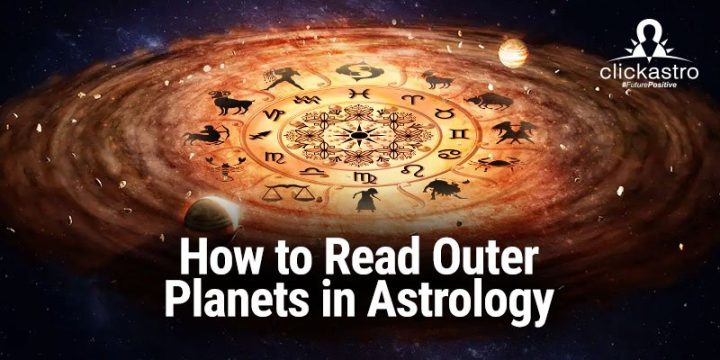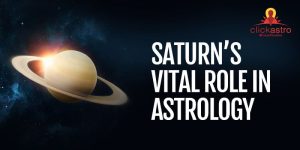Contents[hide]
Reading Outer Planets in Vedic Astrology
In Vedic Astrology, the outer planets Uranus, Neptune, and Pluto are not emphasized in a person’s birth chart, unlike Western astrology. While they are not explicitly mentioned in the Rig Vedas and are not considered prime factors in Vedic astrology, their significance should not be disregarded. These distant planets have a broader influence, albeit not prominently expressed in an individual’s birth chart. Although there is limited information about Uranus, Neptune, and Pluto in Vedic astrology, they play a crucial role in catalyzing major shifts in one’s life and shaping significant global events. Some scholars even associate these three planets with the forces represented by the Tri Dev in Hinduism. Although their influence is indirect, it is far-reaching and impactful. In Vedic astrology, it is commonly believed that the manifestations of these three planets occur through the shadow planets Rahu and Ketu. The effects of Uranus, Neptune, and Pluto are witnessed through Rahu’s materialistic pursuits and Ketu’s inclination towards spirituality and liberation. Consequently, Rahu and Ketu are considered part of the Nava Grahas, which are utilized for analyzing an individual’s birth chart and making predictions. Uranus, Neptune, and Pluto have distinct characteristics in Vedic astrology compared to the traditional planets used for astrological predictions. Unlike the major planets, they do not represent any house, govern any Rashi (sign), or serve as karakas. Instead, they act as powerful background forces that set the stage for significant events, whether on a large scale or globally. Although they lack rulership, their influence is notable when they form conjunctions with other planets or aspect them. Unlike the major planets, which are believed to possess certain flaws, these three outer planets are considered flawless, as they are the embodiments of the supreme Tri Dev in Hinduism and are believed to be perfect in themselves. It is important not to underestimate the significance of these three planets, even in Vedic astrology, as they have the potential to bring about substantial transformations. Without the transit of at least one of these planets, it is difficult to initiate major changes that reshape our individuality.The Role of Uranus in Vedic Astrology
Uranus, the planet of innovation and creativity, holds great significance in Vedic astrology. It is the driving force behind the transformative energies that lead to major changes in an individual’s life. Uranus represents the path of self-discovery, guiding us towards a deeper understanding of our true destiny. Invention and innovation can occur on a personal level or even on a global scale. Through personal discoveries, we uncover hidden aspects of our inherent nature, bringing us closer to our destined path. This process is both enriching and liberating, often taking us by surprise when we least expect it. These epiphanic moments propel us to a higher level of self-awareness. Personal changes driven by Uranus are not mere fleeting events but rather significant transformations that alter the course of our lives. Sudden and dramatic personal changes may also be indicative of unforeseen events such as accidents or injuries that profoundly impact a person’s physical and emotional well-being. On a larger scale, Uranus in Vedic astrology is associated with revolution and societal change. Historical instances of political rebellions and governmental transformations often coincide with Uranus’s challenging aspect to Pluto. Such events may also trigger natural disasters like earthquakes and volcanic eruptions, leading to catastrophic consequences. The influence of Uranus can be described as unpredictable turmoil. When Uranus forms aspects with the Sun or Moon in an individual’s birth chart, the relationship with one’s father or mother is marked by unusual upheavals and unpredictability. These experiences can be emotionally challenging and have the potential to damage the core of the parent-child bond. Similarly, when Uranus is in conjunction with Venus, it can disrupt and strain relationships. Sudden issues and disturbances may arise, potentially leading to the end of the partnership. However, there is a positive aspect to this influence as well. Uranus guides us towards our true destiny, and if a relationship is not aligned with our higher purpose, it may come to an end. The dissolution of such relationships allows us to seek connections that are more compatible with our authentic selves. Despite the disruptions it brings, Uranus transits are often considered significant and transformative. They reveal hidden aspects of our nature and facilitate major changes in our personalities. On a personal level, these transits can be a healthy and positive development. However, during such times, individuals who are not comfortable with our authentic selves may choose to depart from our lives.The Significance of Neptune in Vedic Astrology
Neptune, the second of the outer planets in Vedic astrology, holds a profound role as the preserver of everything. It constantly changes forms, serving as a manifestation of Maya, or illusion. Neptune compels individuals to rise above the illusions and perceive the reality of things. Understanding Neptune can be a challenging endeavour. It is inherently confusing and elusive, causing many to fail in recognizing its true nature. Those who adopt a narrow perspective and are unable to see beyond the superficial appearances become trapped in Maya and may even experience feelings of depression. Neptune embodies both deception and spirituality, influencing individuals in diverse ways. The positioning of other planets in the birth chart is crucial in understanding how Neptune will impact an individual in Vedic astrology. As the preserving force, Neptune is often associated with the manifestation of Vishnu among the Tri Dev. It represents life-giving energy that is not destroyed but rather transferred from one object to another. This constant change of forms contributes to Neptune’s illusory nature. Often, what we associate with hope and happiness does not remain fixed in one person or object, but rather shifts to another. Those who embrace this fluidity of form attain greater happiness and fulfilment in life. They are preserved. Conversely, those who remain fixated on the external appearance and disregard the underlying energy perish, as they fail to transcend the shallow form and grasp the deeper reality that change is essential for preservation. Similar to Western astrology, Neptune in Vedic astrology is also perceived as the unconditional and formless. It transcends fixed forms and manifests itself in various entities at different times. During a Neptunian transit, there is often a shift in something that was once a source of happiness or love, or even a change in career to a new path with better prospects. Those who embrace and adapt to such changes experience spiritual growth. Despite its illusory nature, Neptune also stimulates deeper understanding. It inspires individuals to seek profound meaning in everything and fosters spirituality. However, when Neptune forms adverse conjunctions with Jupiter, it can lead to inclinations towards occult practices or religious fanaticism. Neptune embodies both spiritual enlightenment and extreme fanaticism. Neptune’s influence produces conflicting outcomes in different individuals, even when in conjunction with the same planet. Some may benefit, while others may experience feelings of depression. For example, when Neptune is in conjunction with Venus, some may exhibit love and care for all, while others may feel lust towards multiple individuals simultaneously. Neptune is the eternal preserver, forever elusive and enigmatic.The Profound Significance of Pluto in Vedic Astrology
Pluto, the third of the outer planets in Vedic astrology, is often considered the manifestation of Shiva. It embodies the energy of destruction and reveals the harsh realities of life. By shattering illusions and egos, Pluto guides individuals toward a deeper understanding and ultimate transformation. Thus, Pluto is recognized as the planet of profound transformations. Pluto’s role is to dismantle everything that stems from the ego. Even if an individual achieves spiritual growth, remnants of the ego often persist, granting a sense of ownership and control over possessions. Pluto eradicates this attachment to possessions, striking at the very core of a person’s ego. It compels individuals to confront the crude reality of existence, where they are left stripped of all material belongings. Under Pluto’s influence, a person undergoes a transformative process that may involve losing everything. During Pluto’s transit, it is crucial for individuals to relinquish their ego in order to thrive. The more one clings to their ego, the more they are likely to suffer. Although facing the challenges presented by Pluto’s energy can be overwhelming, succumbing to despair and contemplating self-destruction is not the path to a better life. Instead, true progress lies in relinquishing false pride and ego, and embracing a sense of oneness with the greater reality. By detaching from material possessions and attachments to others, the process of creation can commence anew.Pluto is an immensely destructive force, and its discovery coincided with the era of weapons of mass destruction and nuclear arsenals. In Vedic astrology, Pluto also represents control and dominance. When Pluto is in conjunction with the Sun or the Moon in a birth chart, it signifies a troubled relationship with the father or mother, often characterized by excessive control. Similarly, if Pluto is in conjunction with Mars, the native is likely to experience a tumultuous relationship with their siblings, with frequent conflicts arising even over trivial matters. Despite the great distance between these three planets and Earth, their influence remains considerable, particularly regarding major events on our planet. Much like the Tri Dev, the three planets work in harmony to exert a significant impact on life on Earth. In summary, Pluto holds immense significance in Vedic astrology as the harbinger of destruction and transformation. By dismantling illusions and egos, it enables individuals to perceive the profound realities of life. Letting go of the ego is vital for personal growth during Pluto’s transit. Furthermore, Pluto’s destructive power reflects societal phenomena such as the rise of weapons of mass destruction. Its influence on relationships and control dynamics further highlights its profound impact. Despite their distance, the outer planets play a significant role in shaping the events of our world, aligning with the synergy observed among the Tri Dev.









thanks for beautiful content. i got informative blog. keep sharing.